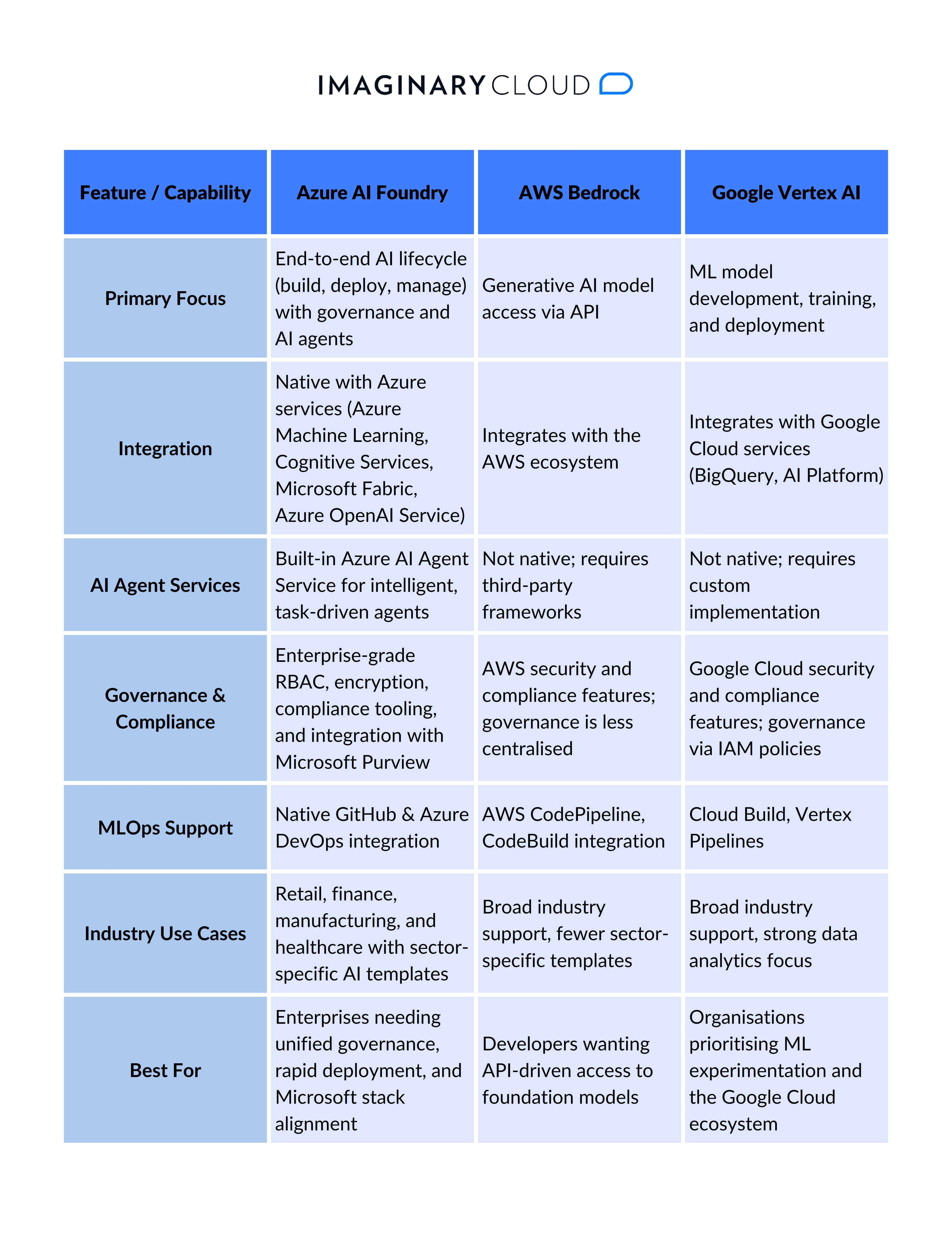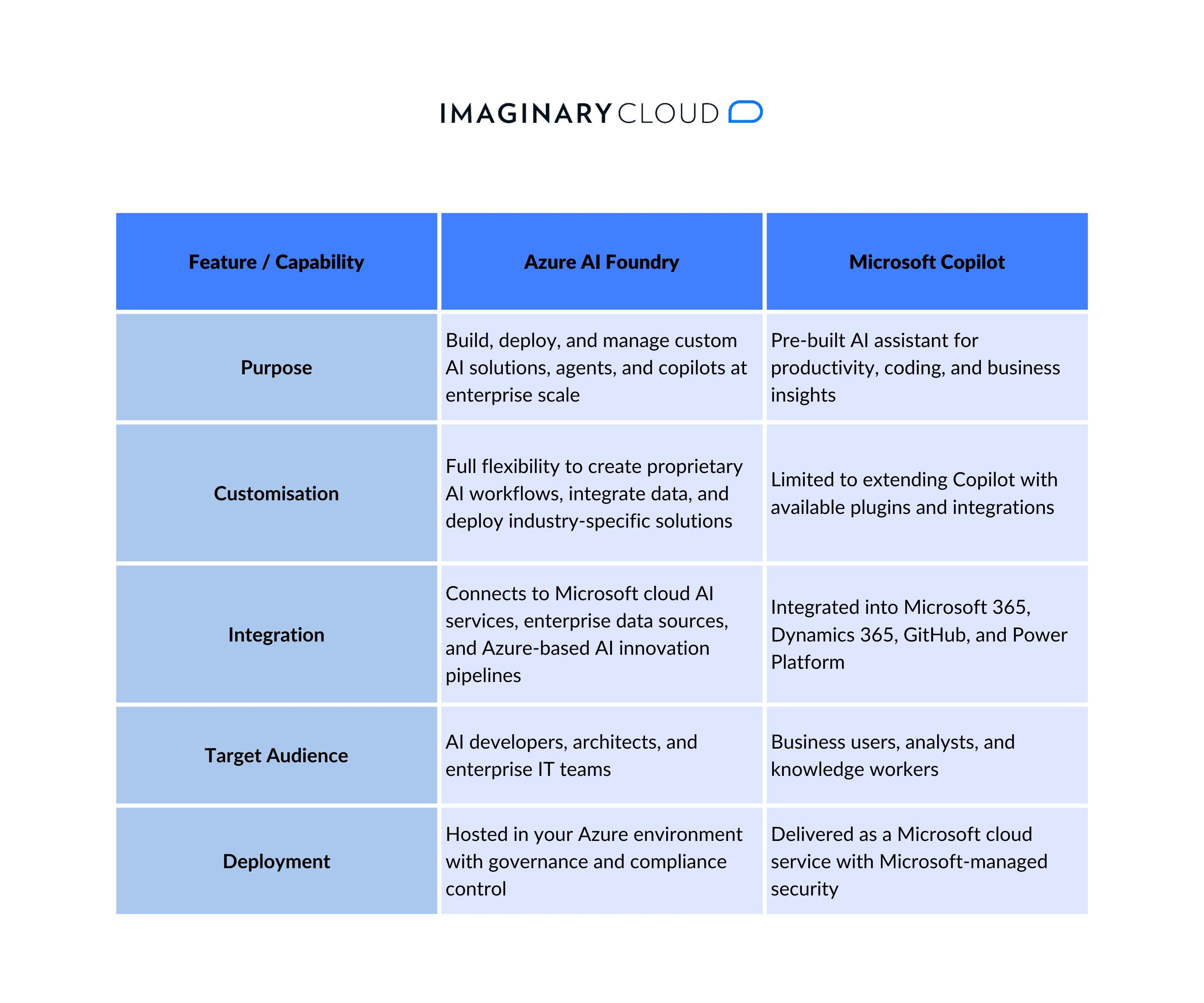contact us

Azure AI Foundry is Microsoft’s unified platform for building, deploying, and managing AI applications and intelligent agents at enterprise scale. It brings together advanced tools, governance capabilities, and integration options to accelerate AI adoption. When supported by an experienced implementation partner, it enables organisations to fast-track AI transformation, minimise risk, and maximise return on investment.
In summary, Azure AI Foundry:
This combination of technology and partner expertise helps enterprises move from concept to value faster, ensuring AI projects deliver measurable business outcomes while meeting security and compliance requirements.
Azure AI Foundry is Microsoft’s end-to-end Azure AI development environment for developing, deploying, and managing AI solutions at scale. It works in collaboration with Azure Machine Learning, Azure Cognitive Services, Azure OpenAI Service, and Microsoft Fabric to provide a complete environment for enterprise AI innovation.
A unified Azure AI development environment simplifies complex AI projects by combining development tools, AI agent services, data integration, and governance into one environment. This makes it easier for enterprises to innovate quickly while maintaining security and compliance.
Key capabilities of Azure AI Foundry:
Why it is a game-changer for enterprises:
For decision-makers, Azure AI Foundry offers a faster, safer path to AI adoption. It bridges the gap between experimental projects and production-ready AI, ensuring that innovation delivers measurable value without compromising governance.
Its integrated workflows support enterprise AI orchestration, aligning AI models, data pipelines, and governance under one roof.
Azure AI Foundry accelerates AI transformation by providing an integrated ecosystem that reduces complexity, shortens development cycles, and enables rapid scaling. Instead of stitching together separate tools and processes, enterprises can use a single platform to move from concept to deployment quickly and efficiently.
Ways Azure AI Foundry speeds up transformation:
Example enterprise benefits:
The key takeaway is that Azure AI Foundry’s pre-built tools, automation, and governance framework shorten development cycles, reduce complexity, and accelerate AI value delivery.
Even the most powerful AI platform requires skilled implementation to achieve its full potential. While Azure AI Foundry provides the tools and infrastructure, a knowledgeable partner ensures those capabilities are applied in ways that meet specific business goals, integrate seamlessly with existing systems, and comply with industry regulations.
“Azure AI Foundry helps bridge the gap between cutting‑edge AI technologies and practical business applications, empowering organisations to harness the full potential of AI efficiently and effectively.”
— Jessica Hawk, Corporate VP, Data, AI and Digital Applications Product Marketing, Microsoft
How expert partners add value:
Why this matters for transformation speed:
1. Shift Technology – Accelerating Fraud Detection in Insurance: Shift Technology implemented Azure AI Foundry with Azure OpenAI Service to modernise fraud detection. This cut claims triage time from weeks to days while meeting strict regulatory standards.
2. Collibra – Enforcing AI Governance in Regulated Industries: Collibra partnered with Azure AI Foundry to embed AI governance controls into sensitive workflows. This includes automatic detection of sensitive data, role-based access control, and compliance enforcement—enabling innovation without compromising regulatory obligations.
In summary, combining Azure AI Foundry with expert partner guidance ensures faster deployment, better integration, and stronger ROI while maintaining compliance.
.webp)
Azure AI Foundry supports a wide range of enterprise applications by combining AI model development, intelligent agent capabilities, and strong governance. Its flexibility makes it suitable for multiple industries and business functions.
High-impact enterprise use cases:
Here are some industry-specific examples:
1. ASOS – Personalised Virtual Styling at Scale: Global fashion retailer ASOS leveraged Azure AI Foundry to launch a virtual stylist assistant combining NLP and computer vision. This AI tool personalises recommendations and guides customers through outfit selection in real time, increasing engagement rates and ensuring consistent shopping experiences across markets.
2. Manufacturing Leaders – Downtime Reduction Through Predictive Maintenance: Companies such as 3M integrated Azure AI Foundry with IoT and Azure Machine Learning to predict equipment failures before they happen. Reported results include up to 25% cost savings and improved asset utilisation.
The key takeaway is that Azure AI Foundry supports diverse, high-impact applications across industries, from customer service and predictive analytics to fraud detection and process optimisation.
When evaluating enterprise AI platforms, decision-makers often compare Azure AI Foundry to AWS Bedrock and Google Vertex AI. While each platform supports generative AI and machine learning, Azure AI Foundry stands out for its deep integration with Microsoft’s cloud ecosystem, enterprise governance, and unified development environment.
Financial Times coverage at Microsoft Build highlights Azure’s AI ecosystem dominance.
Here are their key differences at a glance:

Why Azure AI Foundry leads for enterprise transformation:
While Azure AI Foundry is an end-to-end AI development environment, Microsoft Copilot is a ready-to-use AI assistant embedded into Microsoft 365, Dynamics 365, GitHub, and other products.
Key differences:

Bottom line: Use Azure AI Foundry when you need custom AI solutions, enterprise AI orchestration, and full control over the AI deployment lifecycle. Use Microsoft Copilot for out-of-the-box AI capabilities in Microsoft applications.
A structured, partner-led approach ensures Azure AI Foundry is implemented quickly, effectively, and with minimal disruption. Following a defined roadmap reduces risk and accelerates time-to-value.
Phase 1 – Readiness assessment
Phase 2 – Strategy and design
Phase 3 – Pilot deployment
Phase 4 – Scaling and optimisation
Phase 5 – Ongoing management and innovation
Example timeline: With expert partner support, many enterprises move from initial assessment to full-scale deployment in three to six months.
By following these five phases, organisations can accelerate adoption, maintain quality, and ensure Azure AI Foundry delivers measurable, long-term results.
Accelerating AI adoption with Azure AI Foundry can generate measurable business value in a short time frame. By combining advanced technology with expert partner guidance, enterprises achieve faster returns while reducing operational risk.
Key ROI drivers:
Industry benchmarks:
The key takeaway is that accelerating AI adoption with Azure AI Foundry can generate measurable efficiency, cost savings, revenue growth, and risk reduction within months.
AI transformation is now a business imperative. Azure AI Foundry gives enterprises the tools to build, deploy, and scale AI solutions faster, with stronger governance and measurable results.
If you want to accelerate AI transformation in your organisation, speak with our Azure AI Foundry experts. We will help you design, implement, and optimise AI solutions that deliver real business value. Contact us today to get started.
What is Azure AI Foundry?
Azure AI Foundry is Microsoft’s end-to-end AI platform for building, deploying, and managing AI solutions, agents, and copilots with enterprise-grade governance.
What are the benefits of Azure AI Foundry?
It offers unified governance, integration with Microsoft cloud AI services, pre-built templates, AI agent frameworks, and scalable deployment.
How does Azure AI Foundry compare to AWS Bedrock and Google Vertex AI?
Azure AI Foundry excels in governance, Microsoft ecosystem integration, and enterprise readiness, while AWS focuses on API access and Google on ML experimentation.
Can Azure AI Foundry integrate with Microsoft Copilot?
Yes. Copilot uses Azure AI services as part of its foundation, but Azure AI Foundry enables full custom AI workflows beyond Copilot’s scope.
Is Azure AI Foundry suitable for all businesses?
It’s ideal for enterprises and mid-sized organisations with complex AI needs, but smaller teams can start with targeted projects.
How can I start using Azure AI Foundry?
Sign in to Azure, set up a subscription, create a project in Azure AI Foundry, connect data sources, and deploy a proof of concept.


Alexandra Mendes is a Senior Growth Specialist at Imaginary Cloud with 3+ years of experience writing about software development, AI, and digital transformation. After completing a frontend development course, Alexandra picked up some hands-on coding skills and now works closely with technical teams. Passionate about how new technologies shape business and society, Alexandra enjoys turning complex topics into clear, helpful content for decision-makers.
People who read this post, also found these interesting: